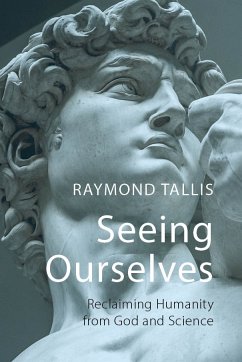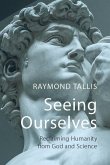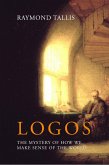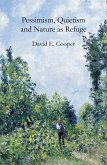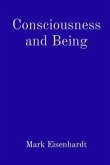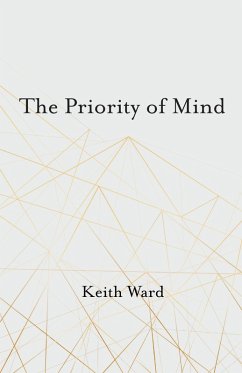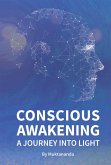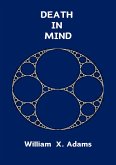In Seeing Ourselves, philosopher and neuroscientist Raymond Tallis brings together the preoccupations of some fifty years of writing and thinking about the overwhelming mystery of ordinary human life, and goes in search of what kind of beings we are, and where we might find meaning in our lives.
If, asks Tallis, we reject the supernatural belief that we are pure spirits temporarily lodged in bodies, handmade by God, and uniquely related to Him, what should we put in its place? How do we ensure, if we accept the death of God, that something within us does not also die? And if we are simply organisms shaped by the forces of evolution, with no reason to exist and with no objective value, as some scientists claim, where shall we find meaning sufficiently enduring and profound to withstand the knowledge of our own mortality and the certain loss of all that we love or value? How should we think of ourselves if we are neither fallen angels trying to enact the will of God, nor unrisen apes acting out a biological prescription?
Tallis begins his quest by establishing what it is we know of our fundamental nature. Showcasing a remarkable detailed engagement with a huge range of disciplines, he examines our relationship to our own bodies, to time, our selfhood and our agency - all manifestations of the unique nature of human consciousness - and shows why human beings are like nothing else in the universe. Having revealed our nature in all its glory, Tallis then addresses what is unresolved in the human condition - our hunger for a coherent life, inwardly lit by a single sense of purpose and meaning - and the search for something that matches the profundity of religion, even to the point of accommodating the tragedy of our lives. He shows that it is the actuality of human transcendence and the needs it awakens that must be the bridge across the divide between believers and non-believers.
The book is ultimately a celebration. Behind the philosophical arguments is a hunger for more wakefulness inspired by a feeling of wonder and gratitude for the mystery of the most commonplace manifestations of our humanity. Tallis's endeavour in Seeing Ourselves is to turn up the wattage of the light in which we see our everyday world and to think more clearly about who we are. It is only when we have woken from religion and naturalism, that we will find ourselves at the threshold of an unfettered inquiry - into ourselves, the world we have built and the universe into which we have built it - and then there may be some hope for salvation.
If, asks Tallis, we reject the supernatural belief that we are pure spirits temporarily lodged in bodies, handmade by God, and uniquely related to Him, what should we put in its place? How do we ensure, if we accept the death of God, that something within us does not also die? And if we are simply organisms shaped by the forces of evolution, with no reason to exist and with no objective value, as some scientists claim, where shall we find meaning sufficiently enduring and profound to withstand the knowledge of our own mortality and the certain loss of all that we love or value? How should we think of ourselves if we are neither fallen angels trying to enact the will of God, nor unrisen apes acting out a biological prescription?
Tallis begins his quest by establishing what it is we know of our fundamental nature. Showcasing a remarkable detailed engagement with a huge range of disciplines, he examines our relationship to our own bodies, to time, our selfhood and our agency - all manifestations of the unique nature of human consciousness - and shows why human beings are like nothing else in the universe. Having revealed our nature in all its glory, Tallis then addresses what is unresolved in the human condition - our hunger for a coherent life, inwardly lit by a single sense of purpose and meaning - and the search for something that matches the profundity of religion, even to the point of accommodating the tragedy of our lives. He shows that it is the actuality of human transcendence and the needs it awakens that must be the bridge across the divide between believers and non-believers.
The book is ultimately a celebration. Behind the philosophical arguments is a hunger for more wakefulness inspired by a feeling of wonder and gratitude for the mystery of the most commonplace manifestations of our humanity. Tallis's endeavour in Seeing Ourselves is to turn up the wattage of the light in which we see our everyday world and to think more clearly about who we are. It is only when we have woken from religion and naturalism, that we will find ourselves at the threshold of an unfettered inquiry - into ourselves, the world we have built and the universe into which we have built it - and then there may be some hope for salvation.
Dieser Download kann aus rechtlichen Gründen nur mit Rechnungsadresse in A, D ausgeliefert werden.

